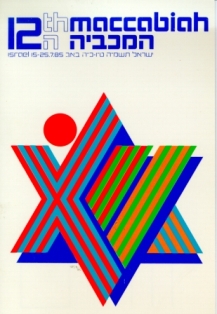 | |
| Host city | Tel Aviv, Israel |
|---|---|
| Nations | 38 [1] |
| Debuting countries | |
| Athletes | 3,700 |
| Main venue | Ramat Gan Stadium |
The 12th Maccabiah Games brought over 4,000 athletes to Israel from 38 nations to compete in 28 sports.
 | |
| Host city | Tel Aviv, Israel |
|---|---|
| Nations | 38 [1] |
| Debuting countries | |
| Athletes | 3,700 |
| Main venue | Ramat Gan Stadium |
The 12th Maccabiah Games brought over 4,000 athletes to Israel from 38 nations to compete in 28 sports.
The Maccabiah Games were first held in 1932. [2] In 1961, they were declared a "Regional Sports Event" by, and under the auspices and supervision of, the International Olympic Committee. [3] [4] [5] Among other Olympic and world champions, swimmer Mark Spitz won 10 Maccabiah gold medals before earning his first of nine Olympic gold medals. [6]
Twenty years after his first appearance in the Maccabiah, Olympic champion Mark Spitz returned to Israel to carry the Opening Ceremony’s Torch into Ramat Gan Stadium. [7] He was accompanied by Shirli Shapiro, Anok Spitzer, and Shlomit Romano, children of three of the Israelis slain in the Munich Massacre at the 1972 Munich Olympics.
Seven men's and 14 women's records were broken in swimming, with the U.S. team winning all but three of the gold medals in this category. Twelve new men's records and 7 new women's records were broken in track and field. The U.S. won 109 gold medals, 90 silver medals, and 74 bronze medals, slightly fewer than half of the medals won by all other countries combined.
Canadian Mark Berger, who had won a silver medal at the Olympics the year prior, won a gold medal in judo. [8] Brazilian Márcio Stambowsky won a bronze medal in judo. [9] [10] [11]
James Espir of the United Kingdom won a gold medal in the 1,500 m run. [12] American Ken Flax won the gold medal in the hammer throw. [13] [14] Canadian Gordon Orlikow, who later was a bronze medalist in the decathlon at the Pan American Games, won the gold medal in the men's decathlon with 7,141 points (finishing in first place in the 110 m hurdles and 1,500 m run, and in second place in the 400 m run, the long jump, discus, javelin, and shot put), and broke the Maccabiah Games record in the 100-meter hurdles at 14.73 seconds, earning a second gold medal. [15] [16] [17] [18] [19]
American Donna Orender played for, was the oldest player on, and was captain of the Team USA women's basketball team. [20] [21] [22]
Robbie Weingard played basketball for Team USA, helping it win a gold medal. [23] Israeli Ari Rosenberg won a silver medal in basketball with Team Israel.
American Ronni Reis won the gold medal, and American Jamie Golder won the silver medal, in the women's singles tennis event. [24] Shawn Lipman represented South Africa in rugby union, winning a gold medal. [25]
American soccer future Hall of Famer Jeff Agoos and Seth Roland competed in soccer for the United States, which came in 6th. [26] [27] [28] [29] [30] Nir Levine competed for Israel, which won the gold medal.
A Junior Maccabiah was held for the first time. [1]
Thirty-eight nations sent delegations. [1] The number in parentheses indicates the number of participants that community contributed.
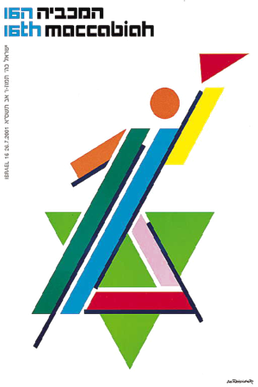
The 16th Maccabiah Games, the Opening Ceremony was held in Jerusalem at Teddy Stadium, while the re-building process of the collapsed bridge and investigations into the collapse continued. The 16th Maccabiah attracted more than 5,000 athletes from 46 countries.

The 17th Maccabiah Games, held in Israel, were an incarnation of the 'Jewish Olympics.' They attracted the largest attendance of any Maccabiah Games, including more than 900 representatives from the United States, almost 500 from Australia, and more than 2,000 from Israel, bringing the total participants to more than 7,700 from 55 countries.
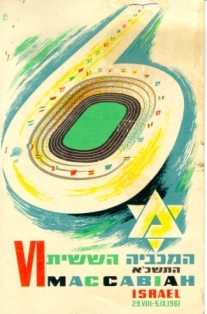
The 6th Maccabiah Games were held in Tel Aviv, Israel in 1961, with 1,100 athletes from 27 countries competing in 18 sports. The Games were officially opened in an Opening Ceremony on August 29, 1961, in Ramat Gan Stadium by Israeli President Yitzhak Ben-Zvi before a crowd of 30,000. The closing ceremony took place on September 5, 1961, at the stadium before a crowd of 40,000, with Israeli Prime Minister David Ben Gurion telling the crowd that he hoped that in the future athletes from North Africa, Poland, Hungary, Czechoslovakia, and the Soviet Union would also compete. The United States won 58 gold medals, Israel won 28 gold medals, and South Africa was third with 11 gold medals. American sportscaster Mel Allen narrated a film about the 1961 Games.

At the 10th Maccabiah Games in Israel, more than 2,800 athletes from 34 countries participated in 26 different sports, including chess and bridge and for the first time badminton.
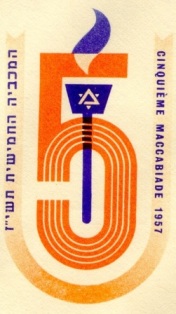
Twenty-one countries sent 980 athletes to compete in the 1957 5th Maccabiah Games, an international Jewish athletics competition similar to the Olympics. The opening ceremony on September 15, 1957, was held in Ramat Gan Stadium, with athletes parading before Israeli President Yitzhak Ben Zvi.
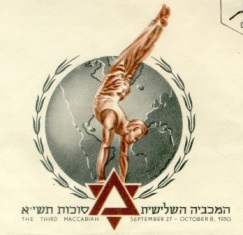
The 3rd Maccabiah took place during Sukkot from September 27 to October 8, 1950, with 17 countries competing. It was the third edition of the Maccabiah Games and the first held since the independence of the State of Israel; 15 years after the previous Maccabiah. Israel won the 1950 Maccabiah Games, Great Britain was second, South Africa third, the United States fourth, Canada fifth, and Austria sixth.

Eight hundred ninety athletes representing 23 countries competed in the 1953 4th Maccabiah Games, held September 20 to 29, in 18 branches of sports.

The 11th Maccabiah Games brought 3,450 athletes to Israel from 35 nations. The Opening Ceremony was held on July 7, 1981, before a crowd of 53,000 and Israeli Prime Minister Menachem Begin in Ramat Gan Stadium, with 3,500 Jewish athletes parading past him. Representative Jack Kemp and a supporter of Israel, marched with the United States team. Israel won the most medals (199), with 65 gold. The United States won 188 medals, 85 gold. South Africa, Britain, and Canada had the next-most number of total medals.
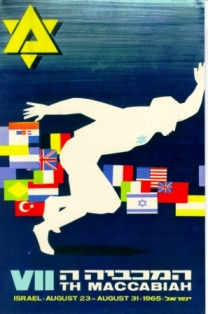
The 7th Maccabiah Games in 1965 saw 1,500 athletes from 29 different countries compete in 21 sports. It was the first Maccabiah Games for Iran, Jamaica, Peru, and Venezuela. The United States delegation won the most gold medals, followed by Israel, the United Kingdom, South Africa, Mexico and the Netherlands, Southern Rhodesia, Australia, Argentina and Italy, and Brazil, Canada, Denmark, and Sweden with one each.
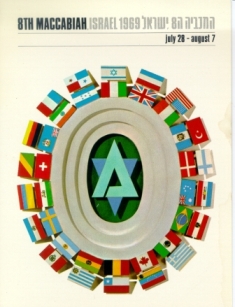
At the 8th Maccabiah Games from July 29 to August 7, 1969, 1,450 athletes from 27 countries competed in 22 sports in Israel. The final gold medal count was the United States in first place (64), Israel second, and Great Britain third (11).
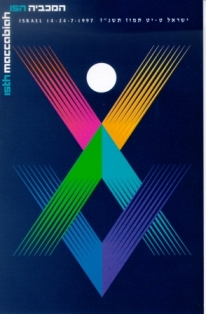
The 15th Maccabiah Games are remembered for being marred by a bridge collapse that killed several participants.

The 9th Maccabiah Games, which were held from July 9 to 19, 1973, were opened in Ramat Gan Stadium, Israel. Spain and Costa Rica made their debuts in the Games. A total of 1,800 athletes competed on behalf of 27 countries in 20 branches of sport, in 30 venues across Israel. The Games took place ten months after the 1972 Summer Olympics in Munich, where 11 Israeli athletes and coaches were slain during the Munich Massacre. The United States won 76 gold medals, and Israel was next with 60 gold medals.
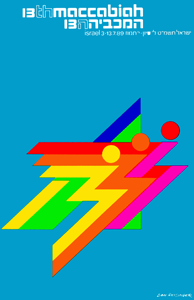
The 13th Maccabiah Games brought 4,500 athletes to Israel from 45 nations.

The 14th Maccabiah Games brought 5,100 athletes to Israel from 48 nations.
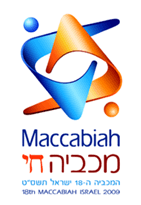
The 18th Maccabiah Games, were held in July 2009. According to the organizing committee these were the largest games held yet. These Games were the world's fifth-largest sporting event, behind the Olympic Games, Commonwealth Games, World Police and Fire Games, and Universiade. On the 13 July, more than 6,000 Jewish athletes from all over the world joined Team Israel's 3,000 participants at the Ramat Gan Stadium in Tel Aviv District, Israel, for the opening ceremony. American swimmer Jason Lezak was given the honor of lighting the Maccabiah torch at the Opening Ceremony.

Shawn Lipman is an American South African-born rugby union player.
Peter Bakonyi was a Hungarian-born Canadian Olympic foil and épée fencer. He competed at the 1968 Summer Olympics in Mexico City. He was also a six-time Canadian national fencing champion, 18-time British Columbia fencing champion, three-time medalist at the Commonwealth Games, four-time silver medalist at the Maccabiah Games in Israel.

The 19th Maccabiah were held during July 18 to 30, 2013.

The 2017 Maccabiah Games, also referred to as the 20th Maccabiah Games, were the 20th edition of the Maccabiah Games. They took place from 4 to 17 July 2017, in Israel. The Maccabiah Games are open to Jewish athletes from around the world, and to all Israeli citizens regardless of their religion. A total of 10,000 athletes competed, a Maccabiah Games record, making the 2017 Maccabiah Games the third-largest sporting competition in the world. The athletes were from 85 countries, also a record. Countries represented for the first time included the Bahamas, Barbados, Cambodia, the Cayman Islands, Haiti, Malta, Morocco, the Philippines, Singapore, South Korea, and Trinidad. The athletes competed in 45 sports.
The 2022 Maccabiah Games took place in Israel from July 14–25, 2022, and are also referred to as the 21st Maccabiah Games. The Maccabiah Games are open to Jewish athletes from around the world, and to all Israeli citizens regardless of their religion. Israeli former Olympic judo medalist Arik Zeevi served as Maccabiah Chairman. Approximately 10,000 athletes from 80 countries competed in 42 sports categories.
O vencedor disputaria a final com Márcio Stambowsky, faixa preta de Rolls, que se encontrava em ótima forma. Como já o havia vencido na academia, Rickson esperava que Márcio lhe desse a vitória, mas este deixou a decisão por conta de seu professor: 'O que Rolls decidir eu faço.'
AABB Champion, Rio de Janeiro Champion, Maccabiah Bronze
Stambowsky began competing in jiu-jitsu tournaments in his native country in 1977 and also at the Maccabiah Games in Israel in 1985 before retiring from competition in 1993. Two years later he coached at the Pan American Games in Argentina.